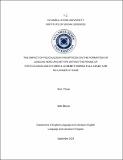DSpace Repository
THE IMPACT OF FOUCAULDIAN PANOPTICON ON THE FORMATION OF JUNGIAN HERO ARCHETYPE WITHIN THE FRAME OF POSTCOLONIALISM IN CHINUA ACHEBE’S THINGS FALL APART AND NO LONGER AT EASE
JavaScript is disabled for your browser. Some features of this site may not work without it.
| dc.contributor.author | İşleyen, Şule
|
|
| dc.date.accessioned | 2021-04-19T07:42:40Z | |
| dc.date.available | 2021-04-19T07:42:40Z | |
| dc.date.issued | 2019 | |
| dc.identifier.uri | http://hdl.handle.net/11547/7255 | |
| dc.subject | archetypes | tr_TR |
| dc.subject | heroes | tr_TR |
| dc.subject | hero archetype | tr_TR |
| dc.subject | panopticon | tr_TR |
| dc.subject | postcolonialism | tr_TR |
| dc.title | THE IMPACT OF FOUCAULDIAN PANOPTICON ON THE FORMATION OF JUNGIAN HERO ARCHETYPE WITHIN THE FRAME OF POSTCOLONIALISM IN CHINUA ACHEBE’S THINGS FALL APART AND NO LONGER AT EASE | tr_TR |
| dc.type | Thesis | tr_TR |
| dc.description.abstractol | The hero archetype that is universal is one of the most recurrent character archetypes in the world literature. Almost all nations have their heroes or heroines although they did not have any direct cultural contact with each other, and these heroes and heroines have some characteristics in common. These characteristics might include superhuman strength, determination, and exceptional bravery, rapid rise to power and hard-won triumphs although they are not limited to these. The arduous tasks to accomplish or challenges to overcome may vary depending on the needs of the society the hero or the heroine belongs to. Another common characteristic of these mortal heroes or heroines is their weakness. In Achebe‘s Things Fall Apart and No Longer at Ease, Okonkwo and his grandson Obi are born into societies that expect their members shoulder some certain responsibilities for the betterment and welfare of the whole nation, and thus they have some predetermined tasks to accomplish. Their fear of failing to meet the expectations of their societies becomes a clear embodiment of Foucault‘s notion of Panopticon and plays an influential role in the accomplishment of these challenging tasks. However, although Okonkwo and Obi have overcome challenges and obtained their goals, both hero archetypes cannot get rid of their fear of losing all their hard-won status. This fear becomes a common weakness for both heroes, and it ultimately brings about the heroes‘ downfalls as it causes them to make irretrievable mistakes. Expectations of society and the tasks to be accomplished by Okonkwo and Obi are remarkably different in pre and postcolonial Nigeria, and they strive to accomplish completely different tasks. Additionally, their ways of overcoming the challenges and achieving their goals are dissimilar. Therefore, this study aims at demonstrating how Michel Foucault‘s notion of Panopticon lays the ground for the formation of Carl Gustav Jung‘s archetypal heroes within the frame of ‗postcolonialism‘ in Chinua Achebe‘s Things Fall Apart and No Longer at Ease. | tr_TR |
Files in this item
This item appears in the following Collection(s)
-
Tezler -- Thesis [3470]
